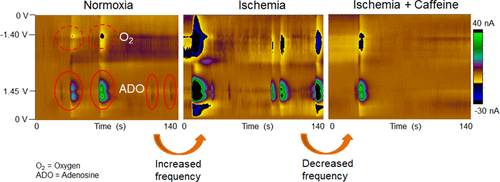当前位置:
X-MOL 学术
›
ACS Chem. Neurosci.
›
论文详情
Our official English website, www.x-mol.net, welcomes your
feedback! (Note: you will need to create a separate account there.)
Caffeine Modulates Spontaneous Adenosine and Oxygen Changes during Ischemia and Reperfusion.
ACS Chemical Neuroscience ( IF 4.1 ) Pub Date : 2018-10-09 , DOI: 10.1021/acschemneuro.8b00251 Ying Wang 1 , B Jill Venton 1
ACS Chemical Neuroscience ( IF 4.1 ) Pub Date : 2018-10-09 , DOI: 10.1021/acschemneuro.8b00251 Ying Wang 1 , B Jill Venton 1
Affiliation

|
Adenosine is an endogenous neuroprotectant that modulates vasodilation in the central nervous system. Oxygen changes occur when there is an increase in local cerebral blood flow and thus are a measure of vasodilation. Transient oxygen events following rapid adenosine events have been recently discovered, but the relationship between adenosine and blood flow change during ischemia/reperfusion (I/R) has not been characterized. Caffeine is a nonselective adenosine receptor antagonist that can modulate the effects of adenosine in the brain, but how it affects adenosine and oxygen levels during I/R is also unknown. In this study, extracellular changes in adenosine and oxygen were simultaneously monitored using fast-scan cyclic voltammetry during bilateral common carotid artery occlusion (BCCAO) and the effects of a specific A2A antagonist, SCH 442416, or general antagonist, caffeine, were studied. Measurements were made in the caudate-putamen for 1 h of normoxia, followed by 30 min of BCCAO and 30 min of reperfusion. The frequency and number of both adenosine and oxygen transient events significantly increased during I/R. The specific A2A antagonist, SCH 442416 (3 mg/kg, i.p.), eliminated the increase in adenosine and oxygen events caused by I/R. The general adenosine receptor antagonist, caffeine (100 mg/kg, i.p.), decreased the frequency of adenosine and oxygen transient events during I/R. These results demonstrate that, during BCCAO, there are more rapid release events of the neuromodulator adenosine and correlated local oxygen changes, and these rapid, local effects are dampened by caffeine and other A2A antagonists.
中文翻译:

咖啡因调节缺血和再灌注期间自发的腺苷和氧变化。
腺苷是一种内源性神经保护剂,可调节中枢神经系统的血管舒张。当局部脑血流量增加时,就会发生氧气变化,因此是血管舒张的一个指标。最近发现了快速腺苷事件后的瞬时氧事件,但缺血/再灌注(I/R)期间腺苷和血流变化之间的关系尚未得到表征。咖啡因是一种非选择性腺苷受体拮抗剂,可以调节腺苷在大脑中的作用,但它如何影响缺血再灌注期间的腺苷和氧水平尚不清楚。在这项研究中,在双侧颈总动脉闭塞 (BCCAO) 期间使用快速扫描循环伏安法同时监测细胞外腺苷和氧的变化,并研究了特定 A2A 拮抗剂 SCH 442416 或一般拮抗剂咖啡因的作用。在常氧 1 小时、随后 30 分钟的 BCCAO 和 30 分钟的再灌注中对尾壳核进行测量。 I/R 期间腺苷和氧瞬态事件的频率和数量显着增加。特异性 A2A 拮抗剂 SCH 442416(3 mg/kg,腹腔注射)消除了 I/R 引起的腺苷和氧事件的增加。一般腺苷受体拮抗剂咖啡因(100 mg/kg,腹腔注射)可降低 I/R 期间腺苷和氧瞬时事件的频率。这些结果表明,在 BCCAO 期间,存在更快速的神经调节剂腺苷释放事件和相关的局部氧变化,并且这些快速的局部效应被咖啡因和其他 A2A 拮抗剂抑制。
更新日期:2018-09-25
中文翻译:

咖啡因调节缺血和再灌注期间自发的腺苷和氧变化。
腺苷是一种内源性神经保护剂,可调节中枢神经系统的血管舒张。当局部脑血流量增加时,就会发生氧气变化,因此是血管舒张的一个指标。最近发现了快速腺苷事件后的瞬时氧事件,但缺血/再灌注(I/R)期间腺苷和血流变化之间的关系尚未得到表征。咖啡因是一种非选择性腺苷受体拮抗剂,可以调节腺苷在大脑中的作用,但它如何影响缺血再灌注期间的腺苷和氧水平尚不清楚。在这项研究中,在双侧颈总动脉闭塞 (BCCAO) 期间使用快速扫描循环伏安法同时监测细胞外腺苷和氧的变化,并研究了特定 A2A 拮抗剂 SCH 442416 或一般拮抗剂咖啡因的作用。在常氧 1 小时、随后 30 分钟的 BCCAO 和 30 分钟的再灌注中对尾壳核进行测量。 I/R 期间腺苷和氧瞬态事件的频率和数量显着增加。特异性 A2A 拮抗剂 SCH 442416(3 mg/kg,腹腔注射)消除了 I/R 引起的腺苷和氧事件的增加。一般腺苷受体拮抗剂咖啡因(100 mg/kg,腹腔注射)可降低 I/R 期间腺苷和氧瞬时事件的频率。这些结果表明,在 BCCAO 期间,存在更快速的神经调节剂腺苷释放事件和相关的局部氧变化,并且这些快速的局部效应被咖啡因和其他 A2A 拮抗剂抑制。











































 京公网安备 11010802027423号
京公网安备 11010802027423号